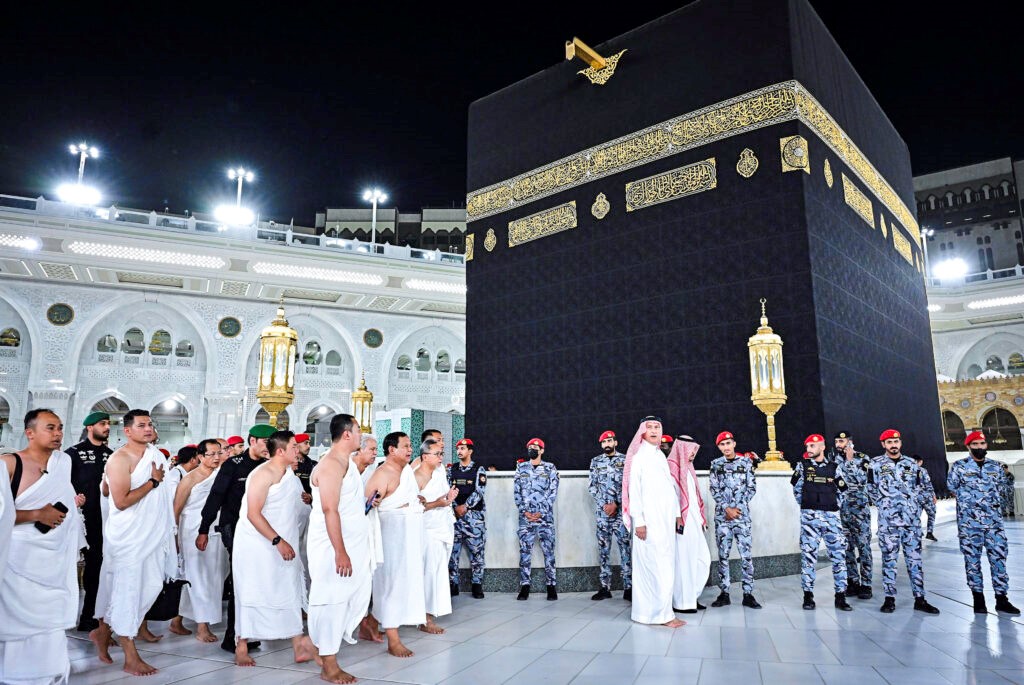Gov’t Monitors COVID-19 Handling and National Economic Recovery Committee Programs, Budget Absorption

Coordinating Minister for Economic Affairs Airlangga Hartarto attends the meeting of COVID-19 Handling and National Economic Recovery Committee (KPC-PEN), Jakarta, Wednesday (26/8). (Photo by: PR of Coordinating Ministry for Economic Affairs)
Coordinating Minister for Economic Affairs Airlangga Hartarto has reported the results of the implementation of COVID-19 Handling and National Economic Recovery Committee (KPC-PEN) duties on the effectiveness of its programs and the realization of budget absorption.
“The meeting will discuss the results of monitoring and evaluation of the implementation of program and budget realization. We will also prepare accelerated steps and efforts for the implementation,” Airlangga, who also serves as Chairperson of COVID-19 Handling and National Economic Recovery Committee, said Wednesday (26/8).
In accordance with the results of monitoring and evaluation during one month implementation of the KPC-PEN’s duties, the Government deemed it necessary to immediately amend Presidential Regulation Number 82 of 2020 on the COVID-19 Handling and National Economic Recovery Committee (KPC-PEN). The first change will be the Organizational Structure and Membership Composition. The new proposal to be included in the amendment will simplify the hierarchy and flow of the KPC-PEN’s task implementation.
For the new organizational structure, it will be divided into policy/program formulation level and program implementation level. At the policy/program formulation structure, it will consist of the KPC-PEN Chairperson led by Coordinating Minister for Economic Affairs and Deputy Chair that consists of seven ministers (Coordinating Minister for Maritime Affairs and Investment, Coordinating Minister for Political, Legal, and Security Affairs, Coordinating Minister for Human Development and Culture, Minister of State-owned Enterprises, Minister of Finance, Minister of Health, and Minister of Home Affairs). At the program implementation structure, there will be the Executive Team that coordinates COVID-19 Handling Committee and National Economic Recovery Committee.
“The Committee should be divided into two levels to keep us remain effective in policy/program formulation and program implementation,” Airlangga said.
All policies and programs will be discussed and decided at the level of the Chairperson and Deputy Chair of the Committee, involving relevant ministry/institution heads, which depends on the issues to be discussed and decided. The Executive Team will focus on the responsibility for Program Implementation Coordination, which coordinates the two committees.
“As Chief Executive, I will focus more on coordinating the implementation of programs carried out by the two committees, and monitoring the program operationalization, as well as ensuring the budget realization for all programs in COVID-19 handling and economic recovery,” Minister of State-owned Enterprises Erick Thohir said.
In addition to rearranging the organizational structure and membership composition, the amendment will also regulate the mechanism for discussion and formulation of programs, reporting mechanism, and matters regarding budget allocation. The Committee Secretariat activities will be financed by Coordinating Minister for Economic Affairs budget, the Executive Team and the PEN Committee activities will be financed by Budget Implementation List (DIPA) of Ministry of State-owned Enterprises, and the COVID-19 Handling Committee will be financed by Budget Implementation List (DIPA) of the National Disaster Mitigation Agency (BNPB).
On that occasion, the Plenary Meeting also discussed the plan to issue a Presidential Decree on Vaccine Procurement and Vaccination Implementation. The regulation of vaccine procurement includes the type and quantity of vaccines provided by Minister of Health. The procurement can be carried out through assignments to Ministry of State-owned Enterprises, direct appointment of Providing Business Entity (private sector), or it can be carried out through cooperation with international institutions. The vaccination will be carried out by Ministry of Health under cooperation with other Ministries/Institutions, regional governments, as well as professional/community organizations.
In vaccination program, Ministry of Health can determine criteria and priority for vaccine recipients, priority areas for vaccine recipients, schedule and stages of vaccination, and vaccination service standards. This determination will be considered by the KPC-PEN. Regarding funding for vaccine procurement, budget provision can be carried out through multiyear budgeting system, advanced payments, an advance payment can also be higher than stipulated (the current maximum requirement is 15 percent).
“In order to ensure that vaccines procurement and vaccination runs smoothly, all relevant ministry/institution heads will provide full support to Minister of Health, Minister of Finance, Minister of SoEs, Minister of Home Affairs, Attorney General, Chief of the Indonesian National Police, the Indonesian National Defense Forces (TNI) Commander, Head of Food and Drug Supervisory Agency (BPOM), Head of the Development Finance Comptroller (BPKP), and Head of the National Public Procurement Agency (LKPP),” Airlangga said.
Besides the amendment of Presidential Decree 82/2020 and drafting a Presidential Decree on Vaccine Procurement and Implementation of Vaccination, there will be an evaluation on the budget realization and absorption for all COVID-19 and the national economic recovery management programs. As of today (26 August 2020), the budget realization of the six economic recovery program groups has reached Rp182.55 trillion or 26.2 percent of the budget.
In the period between July and August 2020, the budget realization has increased sharply from Rp124.62 trillion at the end of this year’s Semester I to Rp147.67 trillion in July, then it has increased by 23.6 percent this August.
In addition, a survey of all programs will be also carried out in order to obtain estimated total budget that will not be absorbed by the end of this year.
“We want to ensure that all budget allocations have programs to be realized. If there are potential programs that will not be realized and not absorbed by the budget, we have prepared several new program proposals with criteria that have a significant impact on our economy,” Airlangga concluded.
Translated by: Syarifah Aisyah
Reviewed by: Yuyu Mulyani








